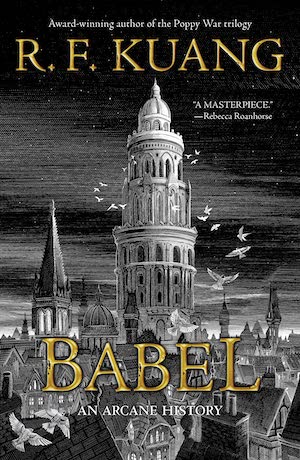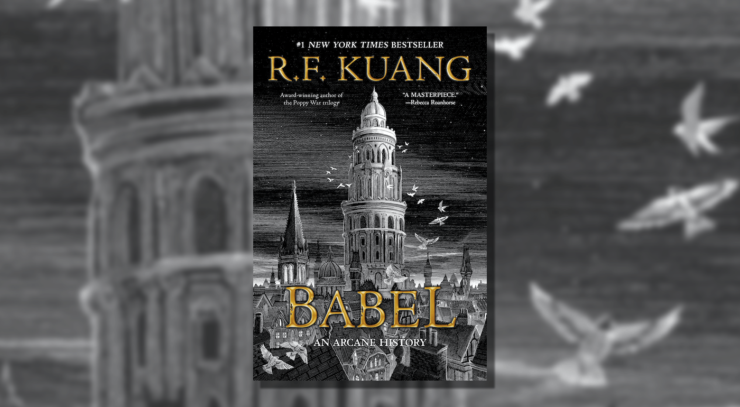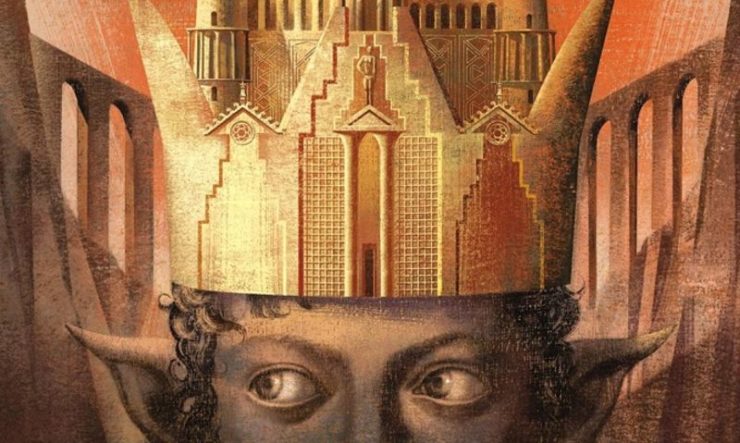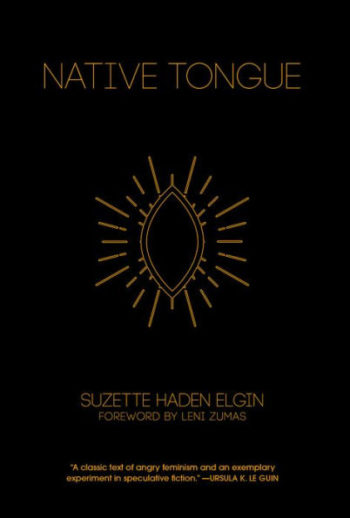R.F. Kuang’s Babel (2022) tells the story of Robin Swift, a Cantonese child who is spirited off to England at age 11 by Professor Lovell, who gives him a rigorous education in classical Greek and Latin and sends him off to Oxford to study translation. Robin makes friends with his classmates: Ramy, from Calcutta; Victoire, from Haiti; and Letty, from England. All four of them face discrimination: the boys and Victoire for their skin tone, and the girls for their gender. The story is about colonialism and empire, and its set dressing is linguistics. The translation institute at Oxford is colloquially known as Babel, and it’s in a literal tower.
The bulk of the novel is set in the 1830s, while Robin is at Oxford. The British Empire, already the dominant imperial power of the 19th century, is expanding its reach, growing poppies in Bengal and trying to force China to buy their opium. Comparative philology is a shiny new field, thanks to Sir William Jones’ realization that you can draw equivalences between Sanskrit and classical Greek and Latin, and philologists have begun reconstructing Proto-Indo-European. There are some who want to reconstruct the Adamic language, claiming that it’s God’s perfect language and all other languages are fallen from grace; some want English to be the Adamic language. All of this is in the book, and all of it is real linguistic history.
Kuang does a really good job depicting the utterly colonialist origins of comparative philology (linguistics’ problematic grandpa). This is the speech credited with starting it all: Sir William Jones, The Third Anniversary Discourse, Delivered 2 February 1786, “On the Hindus.”
The Sanscrit language, whatever be its antiquity, is of a wonderful structure; more perfect than the Greek, more copious than the Latin, and more exquisitely refined than either, yet bearing to both of them a stronger affinity, both in the roots of verbs and in the forms of grammar, than could possibly have been produced by accident; so strong indeed, that no philologer could examine them all three, without believing them to have sprung from some common source, which, perhaps, no longer exists: there is a similar reason, though not quite so forcible, for supposing that both the Gothick and the Celtick, though blended with a very different idiom, had the same origin with the Sanscrit; and the old Persian might be added to the same family, if this were the place for discussing any question concerning the antiquities of Persia.
You can feel the colonialism and Orientalism wafting off of it. (Incidentally, Jones was correct about Gothic, Celtic, and Persian.)
Early on, Lovell delivers a little speech that echoes Jones above regarding the “elegance” of Latin compared to English.
Every language is complex in its own way. Latin just happens to work its complexity into the shape of the word. Its morphological richness is an asset, not an obstacle. Consider the sentence “He will learn.” Ta huì xué. Three words in both English and Chinese. In Latin, it takes only one. Disce. Much more elegant, you see.
It’s in this era that a lot of “rules” like “don’t split infinitives” were made up, because people like Lovell decided that English should be more like Latin, because Latin is more elegant than English and thus more perfect. We also got a lot of our unintuitive, etymological spellings from this era. Debt, for example. It’s from Latin “debitum,” so there’s a B in there, even if we don’t pronounce it and a lot of people just wrote “det” anyway.
Kuang invents a really cool piece of magic called “silverworking,” where someone who fluently speaks multiple languages can inscribe matched pairs of words on either side of a bar of silver and it will have an effect. As explained by one of the professors in Babel, silverworking is “the stuff of language that words are incapable of expressing—the stuff that gets lost when we move between one language and another. The silver catches what’s lost and manifests it into being.”
This is a fuzzy area, but the sense of something always being lost is mostly true. Words have both denotation (the dictionary definition) and connotation (all the associations we make with it). I’ll use an example I’ve been thinking a lot about recently, as an American living in Germany: apple pie. Its denotation would be something like “a dessert consisting of a bottom crust, a sweet filling of apples and spices, and sometimes a top crust.” Its connotation, however, may include everything from America itself to the pie your friend baked for your birthday. Translating it into German is difficult, because “pie” isn’t a concept here, and neither is a tart (unless you’re in a Confiserie). I’ve seen an inch-thick cake covered with apple filling and topped with another inch of cake called “American-style apple pie,” and now I think you understand my current suffering. But if you said pie was like a Strudel, you might get somewhere. (No one has tried this, to my knowledge, unfortunately.)
So. The British Empire has the most silver and the most silverwork, and the reason they want to turn China into a land of opium addicts (beyond the usual “we’re giant racists” one) is so they can get even more silver. Britain buys things from China, like tea, porcelain, and silk, but China doesn’t want anything Britain wants to sell them, so now China has a huge stockpile of silver, and Britain wants to get their grubby colonialist hands on it, so they can increase their strength via silverwork.
What’s so important about silverwork, anyway? Silverwork is responsible for everything from keeping ovens at the right temperature and making carriages go faster and more safely to keeping buildings up and increasing the firing range of a cannon. So of course the Empire wants to possess all of it and prevent their competition from getting at it.
Buy the Book


Babel: Or the Necessity of Violence: An Arcane History of the Oxford Translators’ Revolution
There’s one problem, though. Because people have begun traveling and moving around more, because terminology and loan words move from French to German to English and back, because language changes, it’s become harder to get match-pairs from within the European languages that work, and some have stopped working altogether. There is less lost in translation than there used to be.
Which brings us to why Robin and Ramy are really at Babel: the Empire needs new languages, languages that not everyone around them speaks, in order to find new matching pairs to fuel their magic. To accomplish this, children are taken from England’s various colonies and trained in translation, all so England can continue to exploit those colonies and trade holdings. Babel hoards silver and foreign languages, ensuring that the town of Oxford and all of England remain dependent on them for silverwork and to maintain the magic. (It only works if someone who speaks the languages on the bar speaks the words, and the effect wears off over time. Thus, part of being a Babel scholar is going out and doing the necessary maintenance on carriages and fountains and bridges.)
I loved Kuang’s depiction of the early days of comparative philology, and I appreciated how she not only didn’t shy away from but actually pointed out all the gross colonialist parts, which was part of the point of the novel. It may seem a bit on-the-nose to write a book about linguistics and translation and call it Babel and put the department at the university in a literal tower called Babel, but the whole arrogance of Empire and academia is entirely the point—and what better reference for that is there in the Western canon than the story of Babel?
Have you read the book? Did you have any favorite footnotes on etymology or history? Let’s talk about it in the comments!
CD Covington has masters degrees in German and Linguistics, likes science fiction and roller derby, and misses having a cat. She is a graduate of Viable Paradise 17 and has published short stories in anthologies, most recently the story “Debridement” in Survivor, edited by Mary Anne Mohanraj and J.J. Pionke. You can find her current project, a book on practical linguistics for writers, on Patreon.














